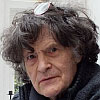Poetry had to unsettle, subvert, with luck destroy, whatever stopped human beings thinking freely and acting justly.
Source: The Economist
No one knew quite how the accident happened: how at some point in the 1970s Heathcote Williams set himself alight on the doorstep of his lover, Jean Shrimpton, an icon of the age, and ended up in Charing Cross hospital. It had evidently started as a conjuring trick; he loved magic, because it gave the illusion of breaking rules. But it was unclear whether he had been eating fire, or breathing it.Breathing it, of course. Words flamed out of him all the time, seeming to make electricity flow through his wild red hair. Poetry was nothing if it was not an incandescent roar. Its role was not to tranquillise. He could write with gentle lyricism if he chose, especially when following in his most famous book, “Whale Nation”, endangered creatures through the sea:
From space the planet is the territory not of humans, but of the whale…
somersaulting like angels or birds…
Naked, with skin like oiled silk, smooth as glass…
no drag, no turbulence, a velvet energy…
But the beauty ended with the winches, spades and slicers of a factory ship, in a slick of oil and blood.
To shock and expose was his job. Poetry had to unsettle, subvert, with luck destroy, whatever stopped human beings thinking freely and acting justly, as he understood justice: consumerism, militarism, modern psychiatry, ossified institutions, brain-numbing new technologies. His “investigative poems”, often long-studied and footnoted, were meant to stop the ravaging of the natural world, not just by Japanese whalers and African ivory-poachers but also by tweedy, trigger-happy, slave-trade profiting, jewel-encrusted British royals.
In water, in the air
Right to the end, starting in the International Times and Oz and then in pamphlets from his Open Head Press, he scorched everything and everyone he hated, from Boris Johnson (“a face that needs to be punched”) to Donald Trump, whose name “suggests…the passing of wind”. He stood in the radical tradition of red-haired Blake, transcending old worlds to build new ones, and wild-haired Shelley, whose youthful rebel-trail through Eton (nearly expelled) and Oxford (defiantly leaving without a degree) he had followed almost exactly. He was Prospero and Ariel, sorcery, mischief and danger, all in one.
Poetry being fire, it had to be part of the body language of the poet. It must be spoken and performed, his mellifluous voice lulling among the wonders in order to underline, more starkly, the horrors. He wanted to move, like the whale, in a sonar world that still contained the pulses of fifty-million-year-old sagas of continuous whale-mind: “elegant cetacean music…lyrical litanies on the bio-radio…rumours of ancestors, memories of loss, memories of ideal love…”
The closest he could come to this was perhaps the state of anarchy in which he lived in the late 1970s, in his Free Independent Republic of Frestonia in Notting Hill, where buildings were squatted and food and beds shared in a ferment of ideas. He wrote his words on walls then, spontaneous swift thoughts: “Housing is a right, freedom is a career.” “Words don’t mean anything today.” Or he shouted them, to make them part of the air the authorities and the people had to breathe.
He went on doing this on stage, television and film, appropriately playing both Prospero and a mad pyschiatrist: an increasingly dishevelled figure with accusing eyes, modelling himself on largely unknown orators of the London streets. The list of poets who had most influenced him, he told Gonzo Today, included Paul Potts the People’s Poet, a homeless pamphleteer; and the men who stood on milk crates in Hyde Park, the subjects of his first book, “The Speakers”, chief among them Bill MacGuinness, who once tried to break into Buckingham Palace to ask for a glass of water, and who said: “When anyone is going to take your mind, make it a blank.”
This was a theme that tormented him: the taking of minds by media or machines. Living, burning poetry already seemed traduced when it was plucked from the air and written down, forced into rhymes and sonnet forms; his was demotic and free-flowing. It was further betrayed by being printed, posted, stored and sold. He would rather give it away, and had to be forced by his publisher to do a single book tour. Commerce would not sully him.
Fame made him run away; celebrity, despite the Shrimpton blip, appalled him. Two plays, “The Local Stigmatic” (written at Harold Pinter’s urging) and “AC/DC”, dealt violently with the modern envy of stars. But “AC/DC” also took on the destruction of minds by machines. Its schizophrenic hero/victim, Perowne, believed he had been programmed to receive TV shows directly, his “instinctual patterns” stolen and replaced; he ended, after a brisk trepanning, admitting cosmic forces his brain could not absorb. In human terms he had indeed become a blank. And this was also happening every day, as Mr Williams wrote in “Autogeddon”: each car journey, “the TV of travel”, sucking people’s neural waves into thought-free “double-glazed mulch”. The answer? Slash the tyres, put sugar in the tank, block the exhaust…
When he died, there were plenty of poets left. But no fire-breathers.
 Heathcote Williams 15 Nov 1941 – 1 July 2017
Heathcote Williams 15 Nov 1941 – 1 July 2017
More about his life and work, here…

